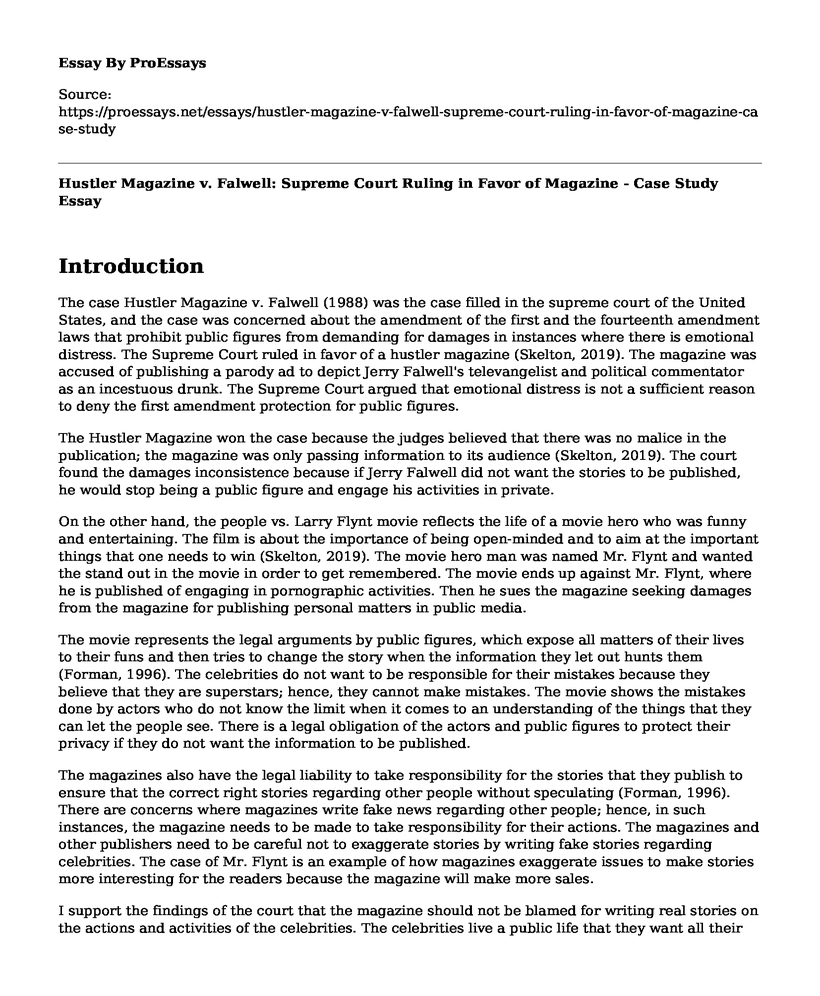Introduction
The case Hustler Magazine v. Falwell (1988) was the case filled in the supreme court of the United States, and the case was concerned about the amendment of the first and the fourteenth amendment laws that prohibit public figures from demanding for damages in instances where there is emotional distress. The Supreme Court ruled in favor of a hustler magazine (Skelton, 2019). The magazine was accused of publishing a parody ad to depict Jerry Falwell's televangelist and political commentator as an incestuous drunk. The Supreme Court argued that emotional distress is not a sufficient reason to deny the first amendment protection for public figures.
The Hustler Magazine won the case because the judges believed that there was no malice in the publication; the magazine was only passing information to its audience (Skelton, 2019). The court found the damages inconsistence because if Jerry Falwell did not want the stories to be published, he would stop being a public figure and engage his activities in private.
On the other hand, the people vs. Larry Flynt movie reflects the life of a movie hero who was funny and entertaining. The film is about the importance of being open-minded and to aim at the important things that one needs to win (Skelton, 2019). The movie hero man was named Mr. Flynt and wanted the stand out in the movie in order to get remembered. The movie ends up against Mr. Flynt, where he is published of engaging in pornographic activities. Then he sues the magazine seeking damages from the magazine for publishing personal matters in public media.
The movie represents the legal arguments by public figures, which expose all matters of their lives to their funs and then tries to change the story when the information they let out hunts them (Forman, 1996). The celebrities do not want to be responsible for their mistakes because they believe that they are superstars; hence, they cannot make mistakes. The movie shows the mistakes done by actors who do not know the limit when it comes to an understanding of the things that they can let the people see. There is a legal obligation of the actors and public figures to protect their privacy if they do not want the information to be published.
The magazines also have the legal liability to take responsibility for the stories that they publish to ensure that the correct right stories regarding other people without speculating (Forman, 1996). There are concerns where magazines write fake news regarding other people; hence, in such instances, the magazine needs to be made to take responsibility for their actions. The magazines and other publishers need to be careful not to exaggerate stories by writing fake stories regarding celebrities. The case of Mr. Flynt is an example of how magazines exaggerate issues to make stories more interesting for the readers because the magazine will make more sales.
I support the findings of the court that the magazine should not be blamed for writing real stories on the actions and activities of the celebrities. The celebrities live a public life that they want all their fans to know what they are doing. The role of the magazine is to pass the information to the fans of the celebrities. Hence the magazine should not be blamed when the public takes the information negatively. The judges involved In Hustler Magazine v. Falwell (1988) case were right for their decision in favor of Hustler Magazine.
References
Forman, M. (1996). The People vs. Larry Flynt [Film]. USA: Columbia Pictures.
Skelton, C. (2019). Hustler Magazine, Inc. v. Falwell, 485 U.S. 46 (1988). Retrieved 25 November 2019, from https://supreme.justia.com/cases/federal/us/485/46/
Cite this page
Hustler Magazine v. Falwell: Supreme Court Ruling in Favor of Magazine - Case Study. (2023, Mar 01). Retrieved from https://proessays.net/essays/hustler-magazine-v-falwell-supreme-court-ruling-in-favor-of-magazine-case-study
If you are the original author of this essay and no longer wish to have it published on the ProEssays website, please click below to request its removal:
- Ethics of Police Deception During Interrogation Annotated Bibliography
- Importance of Self-Defense Classes Paper Example
- Essay Sample on Constitutional Protection Issue
- Building the Wall - Essay Sample
- Essay Sample on Supreme Court Power in National Policy-Making: Whittington & Dahl
- 9/11 Changed Security Paradigm: Preparing, Preventing, Responding - Research Paper
- Essay on Identifying Communication Strategies in Broward Co. Bond Court







